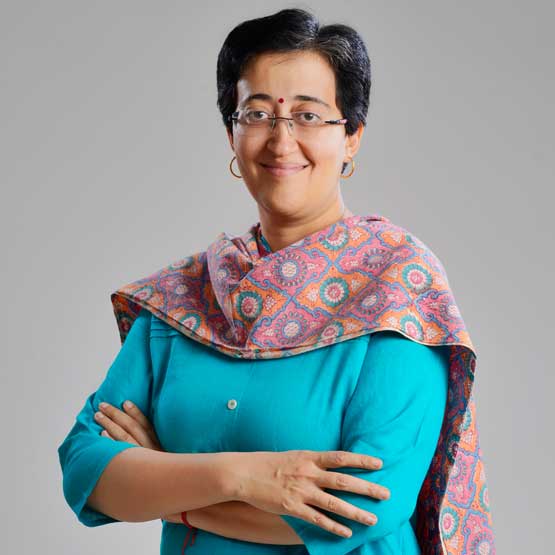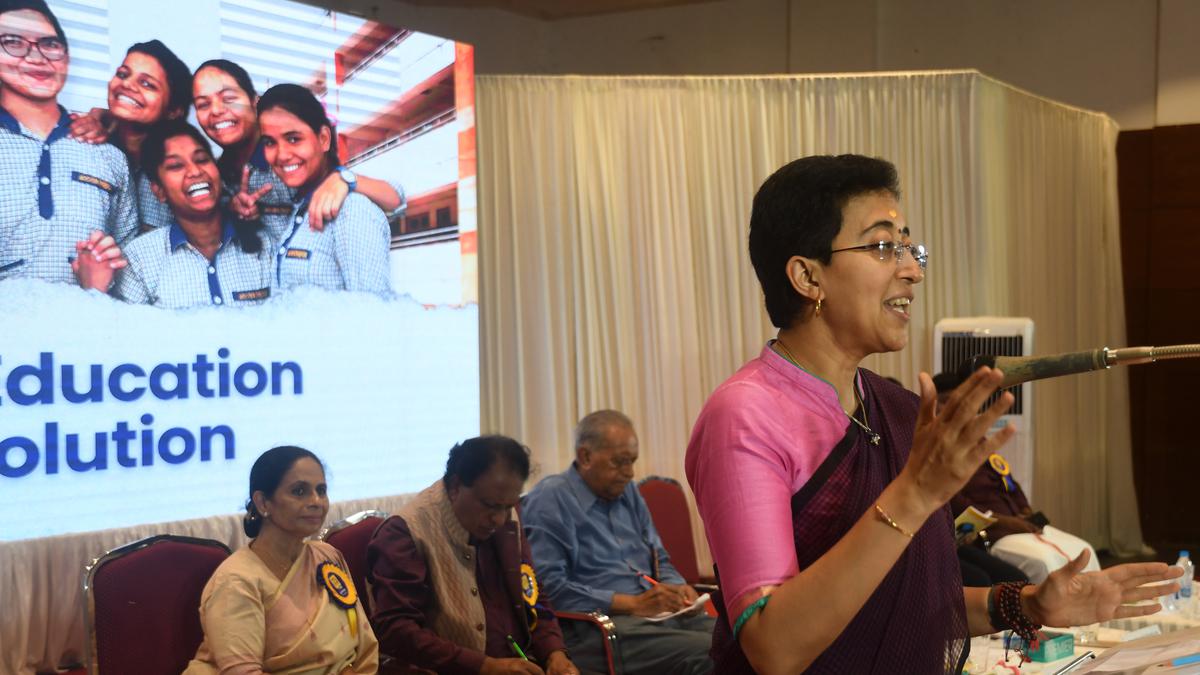Unveiling Atishi Marlena's Choice: Why Keep Child's Name Secret?
Is there a line where public interest ends and an individual's privacy begins, especially when it comes to their children? The decision of Atishi Marlena, a prominent figure in Indian politics, to shield her child's name from the public eye throws this question into sharp relief, highlighting a growing trend among public figures to protect their children from the relentless glare of media attention and potential online threats.
While Atishi Marlena, an influential member of the Aam Aadmi Party (AAP) and a Member of the Legislative Assembly (MLA) representing the Kalkaji constituency in Delhi, remains a subject of intense public and political scrutiny, the details of her child's identity remain conspicuously absent from public discourse. This deliberate withholding of information invites consideration of the multifaceted reasons underpinning such a decision, ranging from cultural norms to very real safety concerns. Atishi Marlena's commitment to transforming Delhi's education system is well-documented, yet her commitment to her child's privacy is equally resolute.
| Attribute | Details |
|---|---|
| Name | Atishi Marlena |
| Occupation | Politician, Educator |
| Political Party | Aam Aadmi Party (AAP) |
| Constituency | Kalkaji, Delhi Legislative Assembly |
| Education | M.Phil. in Education, University of Oxford; Master's in History, University of Delhi; B.A. (Hons) History, St. Stephen's College, Delhi. |
| Key Achievements | Significant reforms in Delhi's public education system; Rhodes Scholar. |
| Website | www.atishi.in |
The deliberate act of keeping her child's name private presents various considerations. The phrase "child's name," seemingly simple, unlocks multiple layers of meaning when dissected through the lens of societal values, personal choices, and potential ramifications. What exactly does this choice reveal about the present landscape, in which public figures strive to balance transparency with the need to protect their families?
- Alex Edelman Is Allbirds Cofounder Your Ideal Partner
- Unlock The Power Of Subhashree Link A Comprehensive Guide
- Privacy: Atishi Marlena's choice underscores a commitment to safeguarding her child's personal sphere from unwarranted intrusion.
- Culture: Across numerous cultures, the practice of withholding a child's name, especially in their early years, stems from deeply ingrained beliefs about protection and warding off negative influences.
- Tradition: The decision might reflect a family tradition of selectively revealing names, particularly if the naming convention involves honoring ancestors.
- Personal preference: At its core, this decision could be a simple matter of personal conviction, a desire to shield her child from the pervasive reach of public scrutiny.
- Protection: The digital age brings with it the ever-present threat of identity theft, making the protection of a child's identity all the more crucial.
- Gender: In some instances, withholding a child's name might be connected to a conscious decision to avoid premature gendering, allowing the child to develop their identity free from societal expectations.
Ultimately, deciding whether or not to reveal a child's name is a deeply personal matter, shaped by individual beliefs, cultural norms, and an overarching concern for the child's well-being. Atishi Marlena's stance reflects this nuanced landscape, prioritizing her child's right to a private existence.
| Name | Occupation | Political Party | Constituency |
|---|---|---|---|
| Atishi Marlena | Politician | Aam Aadmi Party | Kalkaji |
The choice to keep a child's name private is a nuanced decision with multifaceted reasoning, with parents weighing a variety of considerations. In Atishi Marlena's case, this decision sparks reflection on the considerations that influence such choices in the modern world.
- Cultural norms: Numerous cultures observe traditions around naming, sometimes involving a period of secrecy to protect the child. These customs, deeply rooted in folklore and belief, highlight the perceived power associated with a name.
- Family tradition: Within certain families, specific naming practices might dictate when and how a child's name is revealed, potentially linked to ancestral lineages or significant milestones.
- Personal preference: Often, the desire for privacy stems simply from a personal inclination to shield children from public attention, especially as their sense of self develops.
- Protection: In the digital age, safeguarding children's identities against potential online threats, ranging from identity theft to cyber harassment, has become a paramount concern for parents.
In the end, the determination of whether to share a child's name remains a uniquely personal one. Atishi Marlena's deliberate decision to maintain privacy underscores the significance of respecting individual choices in this increasingly interconnected world.
- Aishah Erome Tech Innovator Ceo Role Model In Tech
- Unveiling The Story Of Nakaoa Wolf Manakauapo Namakaeha Momoas Legacy
Cultural practices surrounding a child's name often reflect a deep-seated belief in its significance, viewing it as more than just a label. Instead, it represents a powerful entity connected to the child's identity and well-being. Certain cultures consider a child's name to be intrinsically linked to their destiny, and thus warrant careful protection.
Atishi Marlena's discretion in not disclosing her child's name could very well stem from these deeply ingrained cultural perspectives, aiming to shield her child from potential harm, both physical and spiritual. Her decision could also be attributed to other factors, reflecting a personal desire for privacy in a world where public figures are perpetually under the microscope.
Whatever the underlying reasons, Atishi Marlena's decision acts as a reminder of the importance of respecting cultural practices and individual choices. These practices offer a sense of belonging and serve as a protective measure, safeguarding children as they navigate the complexities of a rapidly evolving world.
Traditions surrounding the naming of a child often stem from the belief that bestowing a name carries the weight of history, lineage, and destiny. Honoring relatives or ancestors through naming practices is a common thread woven through many cultures, reflecting the desire to maintain continuity and imbue the child with positive attributes.
- Facet 1: Cultural Significance
In numerous cultures, naming a child after a forebear symbolizes a profound connection to heritage, solidifying family ties and perpetuating cultural values across generations.
- Facet 2: Personal Connection
For many parents, choosing a name that resonates with their family history evokes a sense of belonging and serves as a tribute to loved ones, both living and deceased.
- Facet 3: Role Models
By naming a child after an admired ancestor, parents can instill a sense of aspiration and provide a tangible connection to qualities they wish to see emulated. This can serve as a powerful source of inspiration throughout the child's life.
- Facet 4: Identity
A name plays a crucial role in shaping a child's identity. When linked to family history, it can foster a strong sense of self, rooted in tradition and belonging.
In the case of Atishi Marlena, speculation remains as to whether her child's name reflects a connection to her ancestry. The fact that she has chosen not to disclose the name fuels curiosity, but ultimately, her decision underscores the importance of respecting personal boundaries and the right to privacy.
At the heart of the matter lies the fundamental right of parents to make autonomous decisions regarding their children's lives, including the critical choice of a name and whether to share it with the wider world.
- Facet 1: Parental Autonomy
The bedrock of parental autonomy is the right to make informed choices about a child's upbringing, encompassing all aspects of their development, including their identity.
- Facet 2: Privacy
A child's name represents a personal data point, and parents retain the right to protect this information, particularly in an era where data breaches and online exploitation are rampant.
- Facet 3: Love and Affection
The selection of a name often symbolizes the deep love and affection parents hold for their child, marking a profound and intimate moment in their lives. Protecting this moment from public consumption reflects a desire to preserve its sanctity.
- Facet 4: Cultural Significance
As previously noted, cultural traditions may dictate a period of secrecy surrounding a child's name, further reinforcing the idea that this decision should be respected and honored.
Ultimately, Atishi Marlena's decision should be seen through the lens of parental rights and the importance of respecting individual choices, even when they diverge from societal norms.
In today's interconnected world, children face unprecedented threats to their safety and well-being, making parental vigilance more critical than ever. The ease with which personal information can be accessed and disseminated online necessitates a proactive approach to protecting children from potential harm.
- Facet 1: Identity Theft
Children are increasingly vulnerable to identity theft, with criminals exploiting their clean credit histories to open fraudulent accounts and engage in illicit activities. This can have long-lasting consequences, impacting their ability to secure loans, rent apartments, and even obtain employment in the future.
- Facet 2: Cyberbullying
The rise of social media has provided a new avenue for bullying, with cyberbullies using online platforms to harass, intimidate, and humiliate their victims. This can lead to severe emotional distress, anxiety, and even depression in children.
- Facet 3: Online Predators
Online predators lurk in the shadows of the internet, seeking to exploit vulnerable children through grooming and manipulation. Protecting children from these dangers requires a combination of education, awareness, and proactive measures to limit their exposure to potential threats.
By safeguarding her child's name, Atishi Marlena is taking a proactive step to minimize their vulnerability to these risks. While this decision may attract scrutiny, it underscores the importance of prioritizing a child's safety in an increasingly complex digital landscape.
The act of naming a child is often intertwined with cultural norms and expectations surrounding gender. Many cultures have historically assigned names based on gender, reinforcing societal roles and expectations from birth.
While traditional naming conventions persist, there is a growing movement towards gender-neutral names, reflecting a desire to challenge societal norms and allow children to define their own identities, free from preconceived notions.
Atishi Marlena's decision to withhold her child's name could be interpreted as a deliberate attempt to avoid imposing gender stereotypes. By keeping the name private, she may be seeking to create a space for her child to develop their identity organically, without the influence of societal expectations.
Ultimately, the decision of whether or not to disclose a child's name and gender remains a personal one, reflecting the parents' values and priorities. Atishi Marlena's choice highlights the ongoing dialogue surrounding gender identity and the desire to create a more inclusive and equitable world for future generations.
This section will address some of the frequently asked questions about child names that will help readers understand the topic.
Question 1: Why might Atishi Marlena have decided not to reveal her child's name?
Answer: There could be a number of reasons behind Atishi Marlena's decision. These could range from cultural customs to a personal desire for privacy, safeguarding against identity theft, or preventing premature labeling of the child's gender.
Question 2: Is it usual for parents to keep their child's name secret?
Answer: Whether parents keep their child's name secret or not varies across cultures. Certain societies traditionally keep a child's name confidential for a period, thinking it offers protection from harmful forces.
Question 3: What are some advantages of keeping a child's name private?
Answer: Keeping a child's name private can significantly lower their risk of being a victim of identity theft, cyberbullying, and unwanted contact from online predators.
Question 4: What dangers are there in making a child's name public?
Answer: Publicizing a child's name can raise the chances of them experiencing identity theft, cyber harassment, and exploitation by online predators.
Question 5: In the end, is it a good idea to keep a child's name private?
Answer: Deciding whether to make a child's name public is a deeply individual choice. It depends on balancing the potential advantages with the hazards and deciding what's best for the child in their specific situation.
Question 6: Where can I find out more about protecting children's privacy?
Answer: Information on child privacy is widely accessible online, in libraries, and through local law enforcement agencies.
Here's the article summary in few words.
The choice of whether to publicly share a child's name remains a personal matter, with benefits and risks needing to be assessed to determine the best course of action.
The section which follows will focus on the criticality of securing children's online privacy.
- Breaking What You Need To Know About Itslaralane Leaks Now
- What You Need To Know Kyla Dodds Onlyfans Leaked Privacy

Atishi Marlena Youth Parliament of India

Invest in children to make India number one Atishi Marlena The Hindu

Atishi Marlena Wiki, Age, Caste, Husband, Family, Biography WikiBio